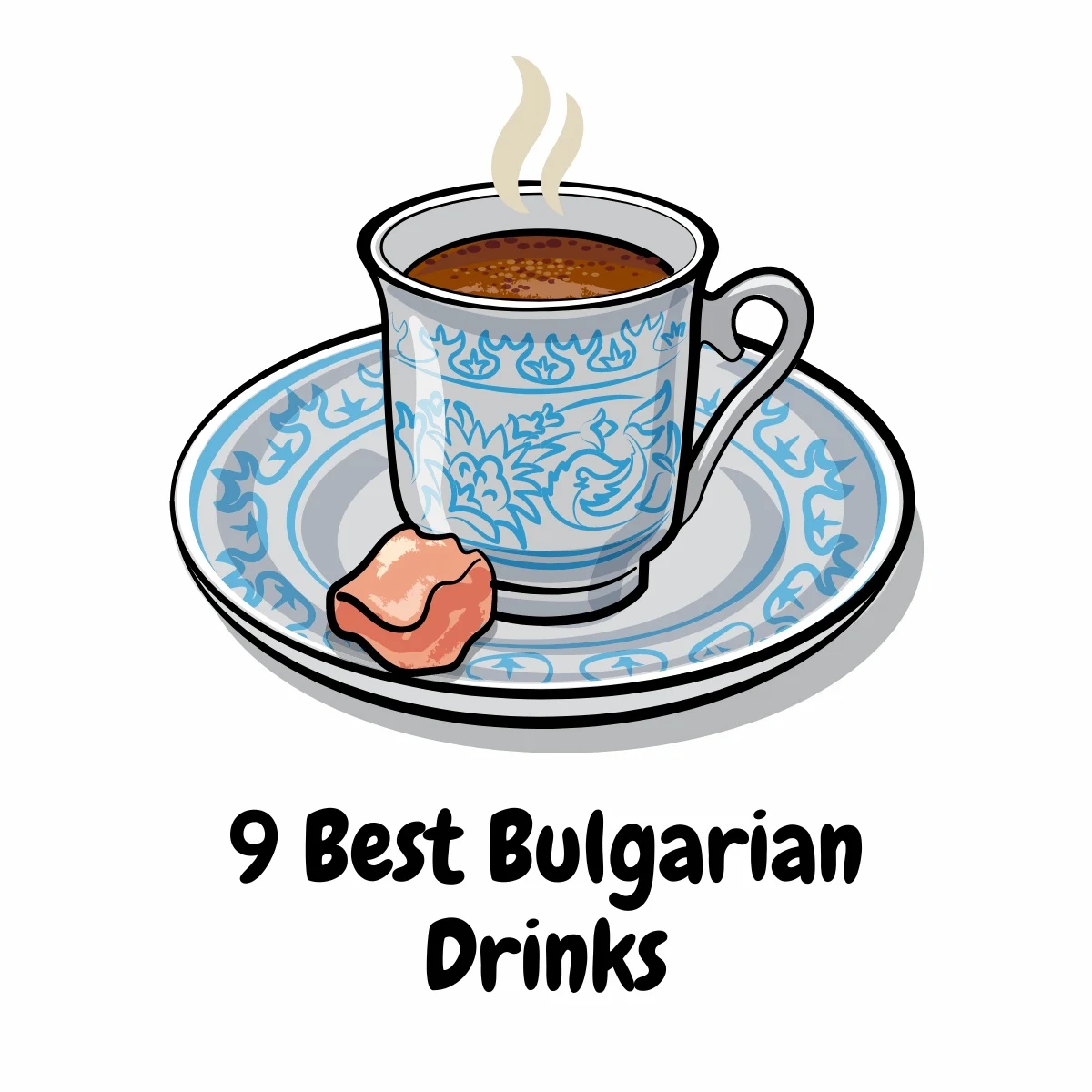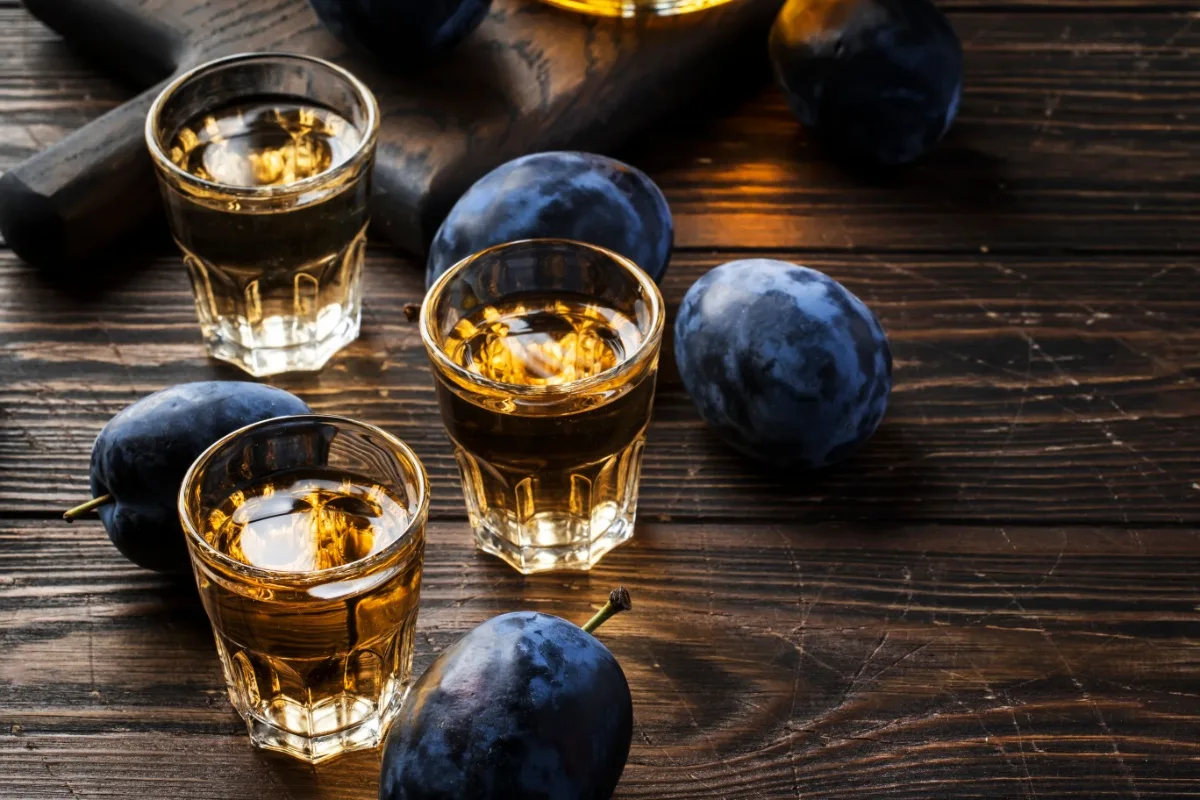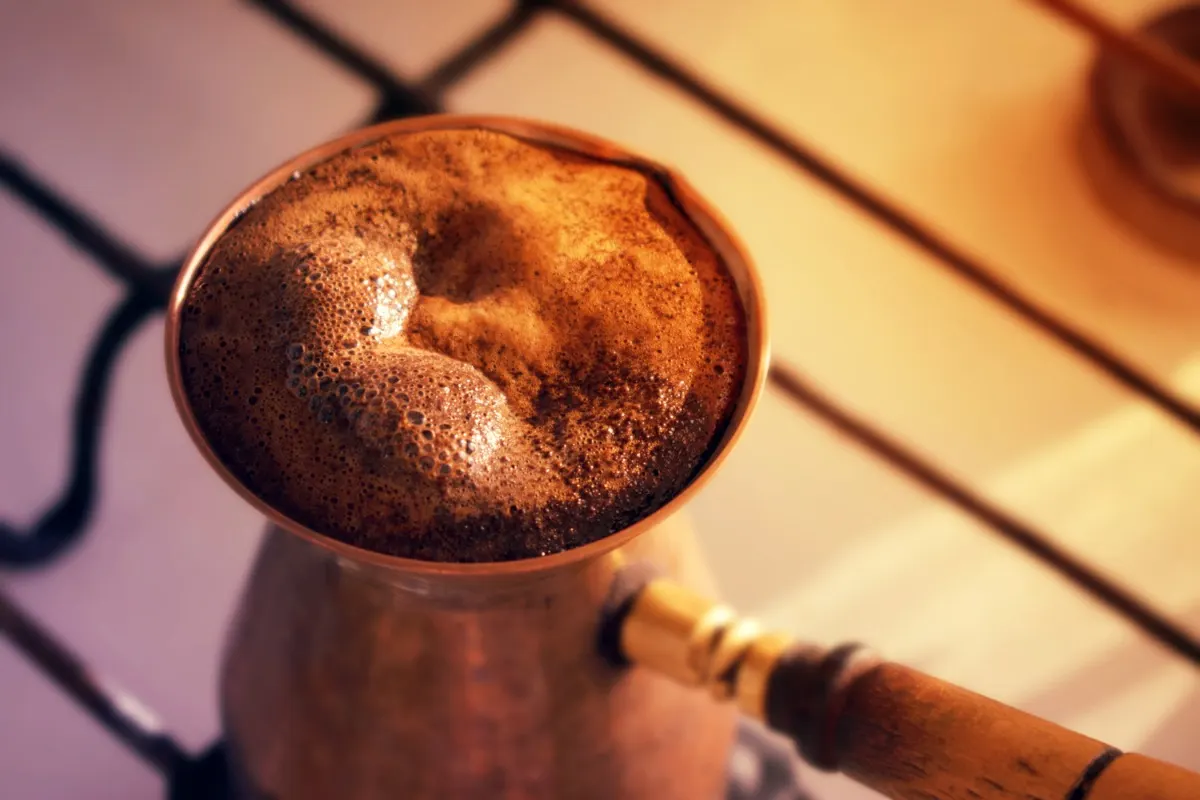If you’re looking to expand your beverage menu, Bulgarian drinks have to make their way onto your list.
Classics like rakia and boza may not be new to many, but there are plenty of other special drinks.
So grab a glass and let’s take a sip into the world of Bulgarian beverages.
Jump to:

Best Traditional Drinks from Bulgaria
Let’s split them into two simple categories: alcoholic and non-alcoholic. And don’t forget to grab some tasty Bulgarian food to pair with your drink.
🍾Bulgarian Alcoholic Drinks
With alcoholic drinks, it’s best to have some snacks at hand. Check out some traditional Bulgarian finger foods to go along with your alcohol.
And drink responsibly!
Rakia

Bulgarian rakia is prepared from fermented grapes, plums, or apricots. It is a clear, powerful fruit brandy with 40-50% alcohol.
Rakia is a national drink and it’s frequently used as an aperitif or digestif in Bulgaria.
The most popular brands of rakia are Burgas 63, Peshterska, Peshterska, Slivenksa Perla and more.
I tried grape rakia at one house party and found it to be quite strong but flavorful. It definitely packs a punch!
Menta

Another popular Bulgarian drink is menta liqueur. Traditional preparation involves infusing mint leaves in vodka or rakia.
Menta can be used to make refreshing cocktails or blended with other drinks.
Mastika

The Bulgarian alcoholic drink “Mastika” tastes like anise. It’s clear and translucent resembling ouzo or sambuca.
This drink is seasoned with mastic, a resin from the mastic tree that tastes like pine or cedar.
This alcoholic beverage is mostly enjoyed at the end of the meal because of its digestive benefits.
If you want both Mastika and Menta in one go, you can try a Bulgarian cocktail called “Cloud”. It’s prepared with water, mastic and mint liqueur.
Bulgarian Beer

Bulgaria has several breweries making a wide variety of beers. Kamenitza, Zagorka, and Ariana are popular Bulgarian beers.
The oldest Bulgarian brewery is Kamenitza in Plovdiv. It serves lagers, ales, and speciality beers.
If you want a light beer, I recommend trying Zagorka, while if you prefer a stronger dark beer, Ariana Dark is a great choice.
Bulgarian Wine

The Thracian Valley, Danubian Plain, and Struma Valley are famous Bulgarian wine areas. The wines of these areas range from crisp whites to full-bodied reds, dessert, and sparkling wines.
Mavrud, one of Bulgaria’s most recognized indigenous grape varieties, produces bold red wines with fruit and spice overtones.
The sandy soils of the Struma Valley create rich, age-worthy red wines from the Melnik vine.
Cabernet Sauvignon, Merlot, Chardonnay, and Sauvignon Blanc are also cultivated well in Bulgaria.
Boza

Boza is a typical Bulgarian fermented wheat or maize drink. It tastes somewhat acidic and is thick and silky.
Boza is famous in Bulgaria and other Balkan nations. Due to its vitamin and mineral content, it is a healthy alternative to other low alcohol beverages.
The alcohol content of boza is typically very low, around 1%. It’s often enjoyed with banitsa for a delicious Bulgarian breakfast.
🫖Bulgarian Non-Alcoholic Drinks
Looking for soft drinks and refreshments? Try some non-alcoholic ideas!
Ayran

A popular Bulgarian drink is ayran, prepared with yogurt, water, and salt. It is a tart, refreshing drink served cold.
Due to its probiotics and minerals, ayran has many health advantages. It’s commonly served with meals or as a summer drink.
Although I’m indifferent to fermented milk drinks, I think ayran is quite good for you if you enjoy that kind of thing.
Mineral Water
The country’s geological richness has produced several natural springs, making it a popular mineral water resort.
Healing springs in Hisarya, Bulgaria, are one of the country’s most recognized mineral water sources. Another one is Devin in the Rhodope Mountains.
Devin, Bankia, and Hisar are famous mineral water brands.
Turkish-Style Coffee

Turkish coffee is very popular in Bulgaria and shows the Ottoman influence on Bulgarian culture. It is a strong, dark coffee prepared in a traditional cezve pot.
Turkish-style coffee is often enjoyed as part of continental breakfast or after meals. It also goes well with locum (Turkish delight) or baklava.
I personally love Turkish-style coffee for its strong taste and caffeine kick. This is how I do it!☕
Ingredients
- 3.4 fl oz water (100ml)
- 1 tsp Turkish coffee grounds
- Sugar (to taste)
Instructions
Prepare:
- Add water (50ml per cup) to the cezve.
- Stir in sugar to taste.
First Boil:
- Bring to a boil.
- Remove from heat, add coffee (1 tsp per cup).
- Remove accumulated foam, mix.
Second Boil:
- Bring to a second boil.
- Remove from heat, discard/keep foam, stir.
Settle:
- Let grounds settle.
- Optional: Add cold water to accelerate settling.
Serve:
- Pour carefully into cups.
- Enjoy your rich Turkish coffee!
Need more Bulgarian culture specials? Check out these sweets—mouthwatering Bulgarian cakes and the top 11 Bulgarian desserts.
